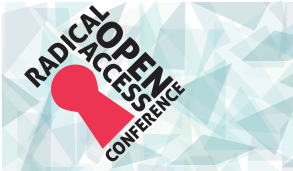Coventry University
15th – 16th of June 2015
Two days of critical discussion and debate in support of an ‘alternative’ vision for open access and scholarly communication. The aim of the conference is to explore some of the intellectually and politically exciting ways of understanding open access that are currently available internationally. A particular emphasis is placed on those that have emerged in recent years in the arts, humanities and social sciences.
This conference is organized by The Centre for Disruptive Media at The School of Art and Design at Coventry University. Attendance and participation is free of charge.
Register and find out more at: http://radicalopenaccess.disruptivemedia.org.uk/
Confirmed Speakers: An Uncertain Commons, Janneke Adema, Dominique Babini, Armin Beverungen, Mercedes Bunz, Marcus Burkhardt, Joe Deville, Kathleen Fitzpatrick, Christian Fuchs, Rupert Gatti, Gary Hall, David Harvie, John Holmwood, Sigi Jöttkandt, Eileen Joy, Chris Kelty, Sarah Kember, Andreas Kirchner, Christopher Land, Stuart Lawson, Tara McPherson, David Ottina, Nate Tkacz, Marisol Sandoval, Joanna Zylinska
Projects and Presses: Culture Machine, CLACSO, Discover Society, Ephemera, Goldsmiths Press, Journal of Peer Production, Journal of Radical Librarianship, Limn, Mattering Press, MayFly Books, MediaCommons Press, MLA Commons, Meson Press, Open Humanities Press, Photomediations Machine, Punctum Books, Scalar, Spheres, tripleC, Vectors
Concept
There is no document of civilization which is not at the same time a document of barbarism. And just as such a document is not free of barbarism, barbarism taints also the manner in which it was transmitted from one owner to another. A historical materialist therefore dissociates himself from it as far as possible. He regards it as his task to brush history against the grain.
(Walter Benjamin, Theses on the Philosophy of History)
While open access has at long last entered the mainstream in the global West and North, it is a particular version of it that is being taken up so widely. Open access is currently being positioned and promoted by policy makers, funders and commercial publishers alike primarily as a means of serving the knowledge economy and helping to stimulate market competition. This version has become so dominant that even those on the left of the political spectrum who are critical of open access are presenting it in much the same terms: as merely assisting with the ongoing process of privatising knowledge, research and the university.
Rather than ‘working with the grain’ of neoliberalism’s co-option of open access, the Radical Open Access conference will reclaim it by asking: what is the potential for supporting and taking further some of the different, more intellectually and politically exciting, ways of understanding open access that are currently available internationally? A particular emphasis will be placed on those that have emerged in recent years, in the arts, humanities and social sciences especially. Radical Open Access will thus provide the impetus for bringing together many of those currently involved in experimenting with ‘alternative’ forms of open access: both to discuss the long, multifaceted critical tradition of open access, its history and genealogies; and to examine a broad range of radical open access models.
As part of its refusal to concede open access, the conference will endeavour to strengthen alliances between the open access movement and other struggles concerned with the right to access, copy, distribute, sell and (re)use artistic, literary, cultural and academic research works and other materials (FLOSS, p2p, internet piracy etc.); and to stimulate the creation of a network of publishers, theorists, scholars, librarians, technology specialists, activists and others, from different fields and backgrounds, both inside and outside of the university. In particular, the conference will explore a vision of open access that is characterised by a spirit of on-going creative experimentation, and a willingness to subject some of our most established scholarly communication and publishing practices, together with the institutions that sustain them (the library, publishing house etc.), to rigorous critique. Included in the latter will be the asking of important questions about our notions of authorship, authority, originality, quality, credibility, sustainability, intellectual property, fixity and the book – questions that lie at the heart of what scholarship is and what the university can be in the 21st century.

Good post. I learn something more difficult on completely different blogs everyday. It’s going to always be stimulating to learn content material from different writers and apply somewhat something from their store. I? choose to use some with the content on my blog whether you don? mind. Natually I?l give you a hyperlink in your web blog. Thanks for sharing.